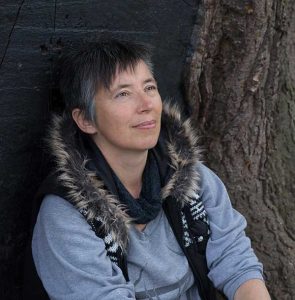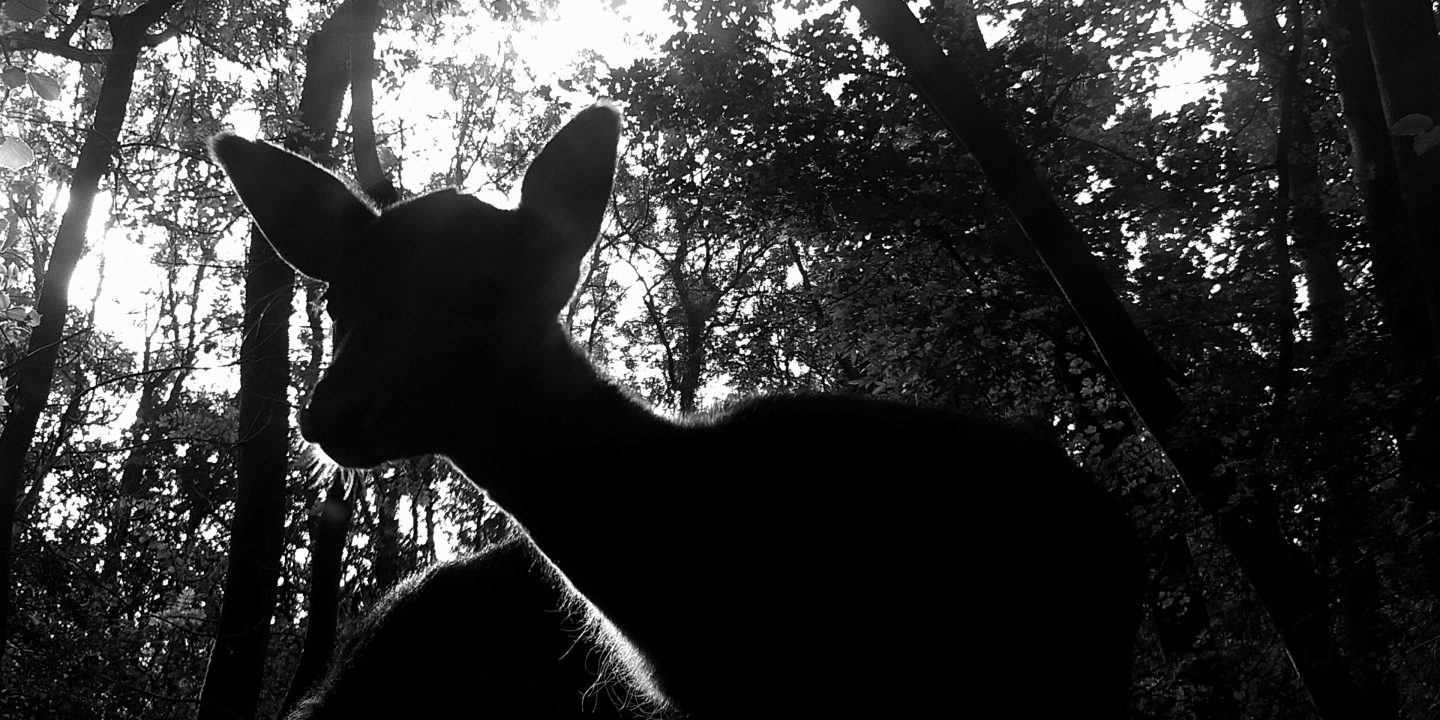Writer, teacher and activist Manda Scott talks to Edgewise about myths, gods and stories in our time of planetary emergency.
‘Myths for me are the stories that hang around,’ says Manda Scott. ‘But the real question is not so much “what is myth about?” as “what are the core features of myth that make it useful to now – and particularly to now?’
Scott emphasises the urgency of this question. For her, myth and its influence is at the heart of the environmental emergency, especially after the underwhelming COP26 in Glasgow. Over the last few years, Scott’s work has focused increasingly on human survival and our place in the wider ecology of life on Earth. She’s part of Extinction Rebellion and since 2019, her Accidental Gods podcast has been gathering many of the most interesting voices exploring the spaces between science and spirituality, politics and philosophy.
Industrialised cultures, she says, ‘have one all-encompassing myth … which boils down to “he with the most toys wins.” Yet no one ever has quite enough stuff, and if I have stuff it means you don’t. However much we tell ourselves it’s not true, it’s really, really hard to step out of that. It’s this myth that has led to the sixth mass extinction because it says that in order to make myself safe and not quite so fragile, I need to take everything.
‘What can we do that would bring everybody back together again?’
‘Because we’re watching a fracturing happen that I think it is incredibly dangerous … What do we do to heal that? What are the stories that will feed all sides of the schism with a sense of belonging and achievement that they are not getting just now?
‘One of the things mythology does is tells us who our tribe is – we are the people who believe this story and it speaks to us. And they are the people for whom [that story] doesn’t speak … we need the myths and the stories that will speak to everybody.’
She’s currently working in collaboration with climate philosopher Rupert Read on a project that she hopes will bring lots of people together to create the stories that need to be told now. ‘It’s going to be a hybrid between a think tank and a writing masterclass,’ she explains.
The sessions will launch on 1 May 2022 and are named after Read’s concept of ‘thrutopia’ – a way of thinking that could take us from where we are now into a liveable future without indulging in the unobtainable escapism of Utopia, or the despairing paralysis of dystopia.
Scott’s ardency and vision are compelling and it’s easy to be beguiled listening to her soft, measured, Scottish accent. But because myth is powerful, it can also be dangerous – there are numerous historical examples of small groups imposing their mono-myths on society with destructive effect. Scott knows this: her Boudica series of novels attacked the Romans for their colonisation of Iron-Age Britain. In those books, she depicted conquest as being achieved through the savage dismantling of indigenous belief, installing Roman gods and myths in place of the local culture.
Is it ever justified to seek to impose a myth – even in our time of planetary emergency? And if it were acceptable, would it work?
‘If powerlessness, separation and scarcity are the fundamental wounds of our culture, a mono-myth that was able to bring us to a sense of agency, and connection, and flow, and generative relations with the world would be a better mono-myth than the one we have got,’ she argues.
‘It would be good if the guy with the biggest spear is not necessarily going to be king.’
One of the greatest glories of myth is that thousands of different stories will shelter, seed and grow under the umbrella of one larger canopy of archetypes. So is it actually those archetypes that need to change? And what is the difference between mythic archetypes and the gods we serve in the name of those overarching ideas? Decades of shamanic spiritual practice have given Scott the chance to study this intersection of gods, spirits and myth. She believes that gods are created by highly focused human intent, and that this intent can create, feed and sustain entities that begin to have their own sense of agency.
‘What defines a god and separates it from the spirit of a mountain, or a river, or an ocean, is that they [gods] begin to actively seek more intent and seek to draw that in and empower themselves and their followers, sometimes at the expense of others.’
Do myths do this? They cohere as a result of a similar harnessing and focusing of human intent, so can they become entities with their own agency? Scott’s reply refers to the indigenous First Nations’ concept of the wetiko, (which she discusses with Alnoor Ladha in an episode of her podcast).
Scott explains wetiko as a behavioural infection that took hold of people who became lost in the wilderness and were forced into cannibalism to survive. It created people without empathy whose hunger for human flesh persisted even when they returned to their settlement and conditions of abundance. It could be cured if the community had the right culture to hold the returnees, but if it wasn’t treated, it could spread and infect a whole society.
‘It was a myth for the native north Americans but for white people, this is how the world is, this is the way it has been from before Roman times. When I wrote Boudica I thought I was writing “this is who we were, this is who we could be now if we let go of the Romanisation” because for me the capitalism, the destruction, the wetiko, arrived on these lands from Rome. That is not to say it wouldn’t have come another way, but Rome brought the distraction and the severance from the land and everything that comes with it. The Romans brought marriage and the disintegration of tribal structure, which put people into little nuclear family units, so then you can set them against each other because a tribe is quite a strong entity and a family is much less strong.’
While Scott does not absolve the Romans of colonial damage, she now wonders if the origins of the fractures in Western culture lie deeper and earlier.
‘Some gods get to the point that they seek to empower themselves with destruction and pain – is that the point at which the wetiko myth takes on agency? And was that because it has human intent behind it, or was it there already in our Palaeolithic minds?’
That’s an unanswerable question. But what if it’s the nature of the universe to communicate – and we are wired to communicate back? What if the universe, or ‘all that is’, demands a constant exchange of information, a polyphonous singing back from everything within? If this is the case, then could it be that when humans create myths, potent things happen in response, not because we are creating entities from inanimate dust and nothingness, but because the universe answers all the time in the same language that we speak to it – we are in a continual conversation. Stories are how we mediate this massive flow of language and information; they wrap around our experience of the world and hold us in their web.
If this is true, then story-makers of all kinds are needed now more than ever. As Scott says, it doesn’t matter what medium we are working in, whether it is oral storytelling, literature, poetry, computer games, film and photography, song writing – anything that can hold narrative. Our challenge is to see that the future has its myths, as well as the past.
This piece was written by Sara Hudston and drawn from a longer conversation between Manda Scott, Esther May Campbell and Sara during the Poetics of Imagination MA at Dartington. Esther originally contacted Manda during the course module three, which focuses on Celtic material, including the Mabinogi.
The header photo of a fallow doe is by Esther May Campbell and was taken in October 2021 as part of her Deer Residency in an area of ancient woodland on the edge of East Anglia.
Keep an eye on Manda Scott’s Accidental Gods website for more details about the Thrutopia Masterclass.

Sara Hudston is a Dorset-based writer and photographer who focuses on the living world and spirit of place. She writes fictions and non-fiction and is a regular contributor to the Guardian’s Country Diary. https://sarahudston.co.uk
See also her short video piece on Edgewise: Two Hours On Dartmoor and her long read Solitude My Secret Joy.

Esther May Campbell is a photographer and film maker from the West Country. She works with her local community as an artist and mentor.
See also her images on Edgewise: The Woods to us a Kingdom Is.

Deer photo © Esther May Campbell 2021
Words © Sara Hudston 2021
